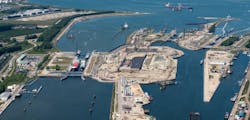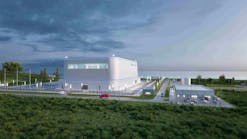Canadian firms working on Waste Heat Recovery at Quebec Computing Center
Computing center developer QScale has partnered with energy firm Énergir Development to maximize waste heat recovery in the Québec province of Canada.
According to QScale, the collaboration will combine the expertise of the two companies in recovering and optimizing the use of heat generated by computing centers to decarbonize Québec.
Under the terms of the agreement, QScale will deliver free waste heat from its centers, while Énergir will ensure project implementation from design through to operation, following pre-feasibility studies and confirmation of technical and economic viability.
“Our mission is to design world-class computing centers aligned with sustainable development principles,” said Martin Bouchard, Co-founder and President of QScale. “Supercomputers hosted in our computing centers act as radiators, generating heat. QScale is specifically designed to recover 100 percent of this waste heat. It is therefore natural for QScale to partner with a recognized partner such as Énergir, which aims to diversify into sustainable energy distribution.”
The first waste heat recovery projects will be developed at QScale’s Q01 campus in Lévis, with the first delivery of recovered heat anticipated by early 2024. Up to 96 MW of energy could be distributed through energy distribution networks, enough to heat more than 15,000 Québec households, QScale says.
See EnergyTech's full coverage of District Heating in the C&I Energy Transition
Our latest Email Newsletter with stories on Biofuels, E-Mobility and More
This week's Webinar on Cybersecurity Strategies for Industrial, Energy and OT: Featuring Dragos
The collaboration is also expected to support Énergir in its mission to help its customers decarbonize by providing them with carbon-neutral heat.
The process of waste heat recovery involves reutilization of excess heat produced by a company in its vicinity. In Québec, a significant proportion of the energy consumed by large industries, nearly 35 percent, goes unrecovered. The potential for waste heat recovery is vast, and projects focused on this area offer considerable environment benefits, making them a crucial component of Québec’s energy transition policies.
QScale notes that the strategic location of the Q01 campus site provides ample opportunities for waste heat recovery, with around 100 hectares of farm and industrial land in the vicinity. Advantages of waste heat recovery includes lower heating bills; potential improvements in energy balance, leading to carbon neutrality; and a continuous supply of heat due to the computing 24/7 operations of the computing center.
“We are thrilled to be joining forces with QScale for this collaboration, which aligns perfectly with our 2030 Vision to diversify our operations and provide solutions that will contribute to the success of our decarbonization efforts and those of Québec,” said Jean-François Jaimes, Executive Director, Development, Renewable Energy and LNG at Énergir.





